People Are More Concerned About Climate Change Than Two Years Ago – Here’s How Brands Can Help
6 Mins Read
Consumer concern about the climate crisis has escalated since 2022, but half of the world finds sustainable living expensive.
With climate scientists sounding the alarm about the unrealistic path to 1.5°C – just as the Arctic burns, the Amazon is cleared, and America reels from its deadliest hurricane in two decades – how governments reshape their policies is key to the planet’s future.
As is consumer behaviour. The climate crisis affects everyone, everywhere in the world, and taking individual action is critical. A new survey of nearly 19,000 people by consultancy firm Bain & Company found that 76% of the world’s population says practising an eco-friendly lifestyle is impactful and important.
The poll – which comes as the world deals with two geopolitical wars, the rise of artificial intelligence, and continued inflation – revealed that 61% of people in the 10 countries covered are more concerned about this climate crisis now than they were two years ago, often sparked by personal experience of extreme weather events, which have become more frequent as the world heats up and our atmosphere becomes more carbon-heavy.
These consumer concerns have also pushed companies and their leaders to bring about change. “For sustainability, 2023 was the year boundless excitement gave way to pragmatic realism. As the challenge of meeting bold commitments became clear, many companies started to rethink what is achievable and on what timeline,” said Jean-Charles van den Branden, leader of Bain’s Global Sustainability practice.
Regional disparities in climate perceptions

The pollsters asked the opinions of people in the US, the UK, the Netherlands, Germany, France, Italy, Japan, China, Brazil, and Indonesia. The latter two exhibited the highest rise in concerns over climate change from 2022, at 78% and 73%, respectively.
Meanwhile, the Netherlands (50%), the US, and Germany (both 51%) had the lowest numbers – but the fact that this was a still 50% rise in concern from two years ago speaks volumes of how the climate emergency has affected the world.
These trends continue in the number of respondents who feel taking individual action is important, with 90% of Brazilians and Indonesians agreeing with this statement, versus 65% of Dutch and 67% of German consumers. The country with the lowest percentage of people who believe their actions have an impact, though, is Japan (64%).
And just as these beliefs change based on where a person lives, their approach to a sustainable lifestyle also differs based on “factors ranging from cultural norms to political leanings”, the report found.
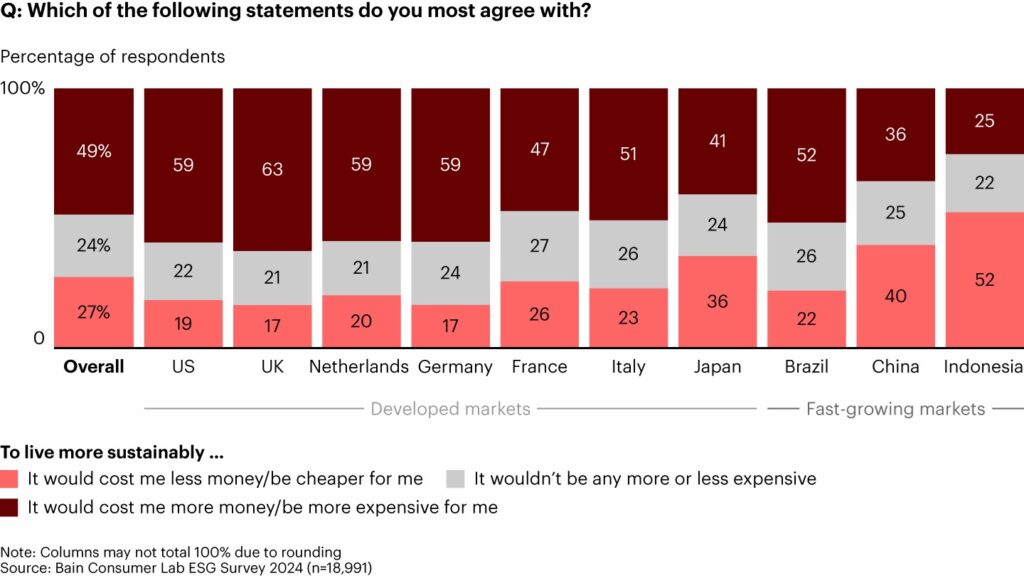
It also revealed that consumers prefer different eco attributes depending on the product, but ‘natural’ is always the top purchase motivator, key for over a third of respondents for fresh and packaged foods, beauty and personal care, and household cleaning supplies.
However, the sustainability transition has been hampered by the view that sustainable living is always more expensive, with 49% of respondents saying so (versus 27% who feel it would be cheaper to be more eco-friendly). The only country where more people say sustainability costs lower (52%) than those who say it’s costlier (25%) is Indonesia, a developing economy.
In the US, though, consumers are willing to pay up to 10% more for products that have a lower climate footprint, and up to 15% higher for those that have health benefits.
People are eating less meat for climate and health reasons
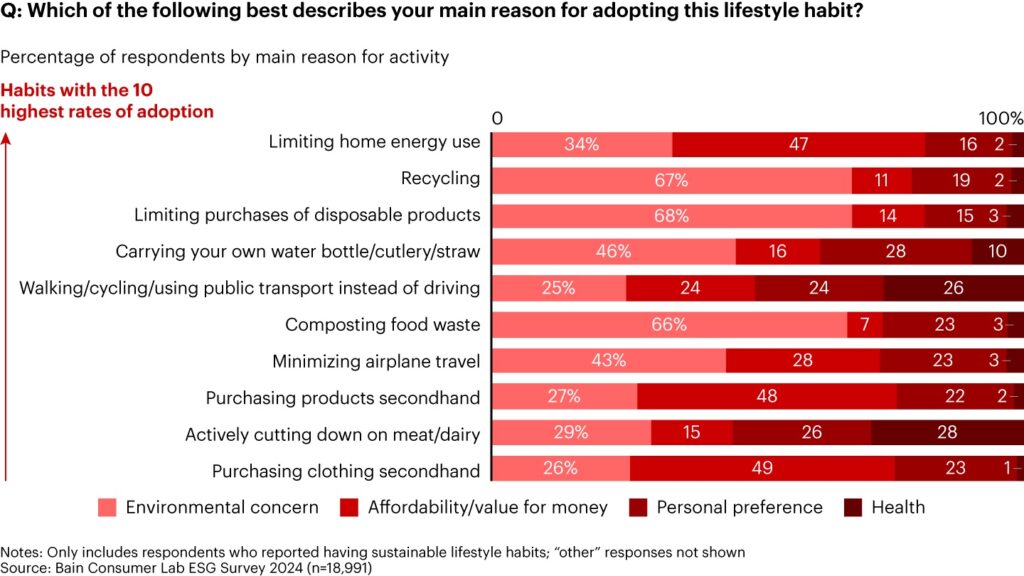
The idea that living in a planet-friendly manner is heavy on the wallet isn’t always true, the report’s authors argue. “Some consumers, while trying to save money, are adopting habits that also happen to be more sustainable, such as driving less, buying secondhand clothing, and, in some cases, actively cutting down on meat and dairy,” it stated.
The most popular actions adopted by people for environmental reasons are recycling (68%), limiting purchases of disposables (67%), and composting food waste (66%). When it comes to lowering at-home energy use, minimising air travel, or purchasing secondhand clothes, more people do this for affordability than for climate concerns.
Consumers are also walking, cycling or taking public transport as an alternative to driving, whil actively eating less meat and/or dairy, but they’re swayed by several factors here. For example, while 29% of people are cutting down on animal proteins for climate-related worries, 28% are doing so for health, and 26% for personal preference. The remaining 15% are shifting their dietary habits out of affordability concerns.
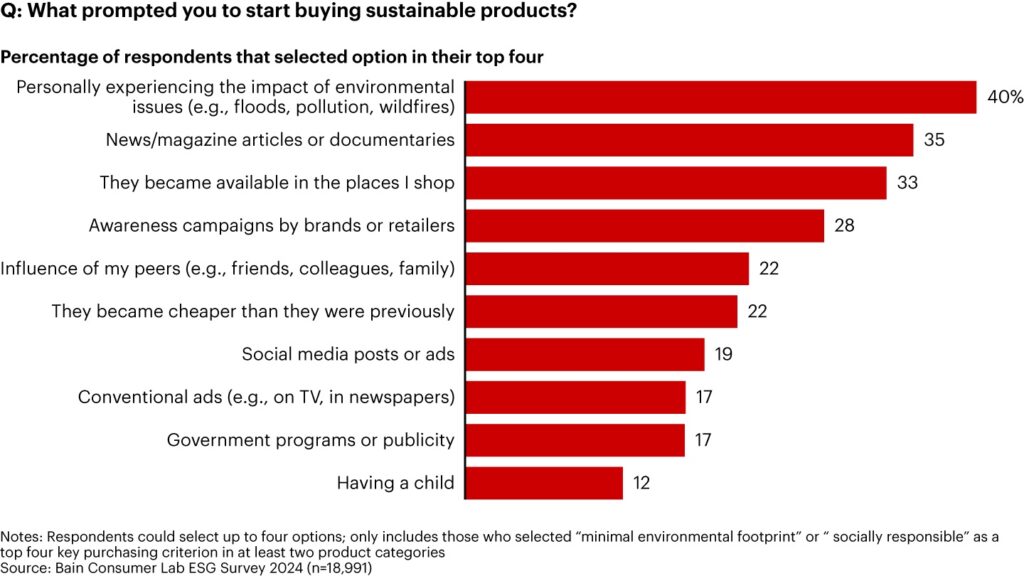
The main drivers of these actions are personal experiences of extreme weather (40%), media coverage (35%), product availability and access (33%), and brand campaigns (28%).
But companies need to take better action, given that many are behind schedule to reach their 2025 recycling targets. The environmental impact of packaging is important to half of all consumers, particularly in Indonesia (85%), Brazil (76%), and China (74%). Americans are on the other end of the spectrum, with only 41% caring about this metric, and 22% not finding it important.
The survey showed that consumers are most concerned with the end of life of packaging, or what happens after using ht product. Nearly half of consumers (48%) look for recyclable packaging attributes when shopping, while 40% do so for reusability and 38% for recycled packaging.
What can brands do to solve sustainability and consumer concerns?
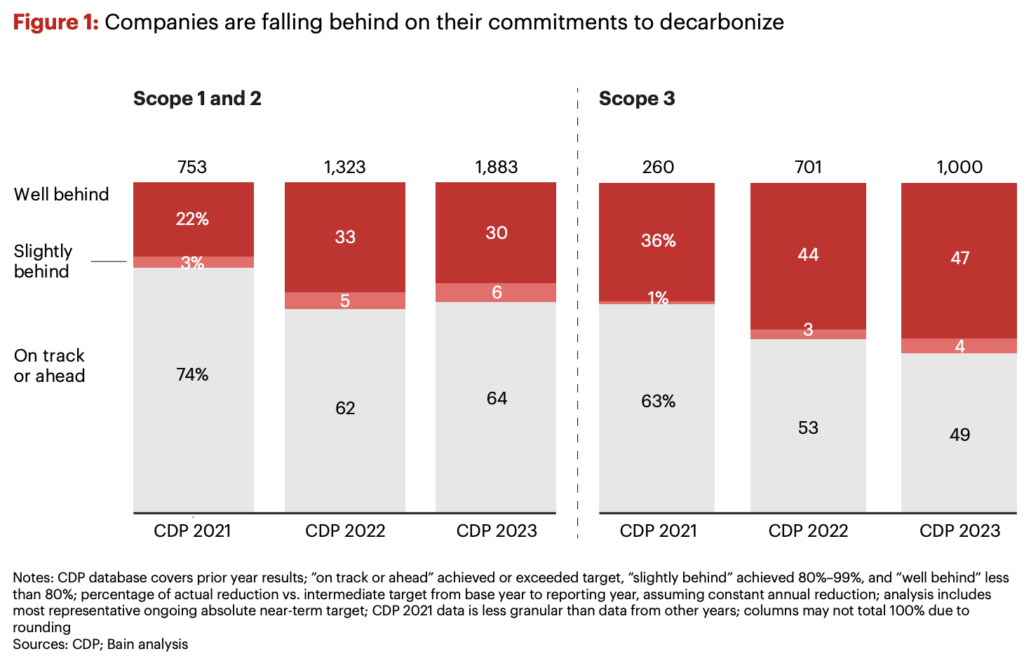
Bain’s analysis of data from the Carbon Disclosure Project revealed that more companies are falling behind their decarbonisation targets. Today, over half (51%) of businesses are not on track to deliver their goals for scope 3 emissions (which entail the entire supply chain of a company and account for up to 95% of corporate emissions), compared to 37% in 2022.
And in a damning finding, only 29% of global consumers trust large companies, compared to 48% who have faith in small, independent businesses. So what can brands do to clean up the air and consumer concerns?
Companies must invest in developing products that meet untapped sustainability needs, coupled with the right messaging to help consumers in their quest for sustainability – this means figuring out where people are willing to pay more and where businesses can make some profits, and taking this trial-and-error approach to innovation and marketing.
Corporations also need to update their operating models, since supply chain teams are often detached from marketing and an understanding of what customers value. The costs and benefits can be misaligned, making the company miss opportunities to advance sustainability and gain value among consumers.
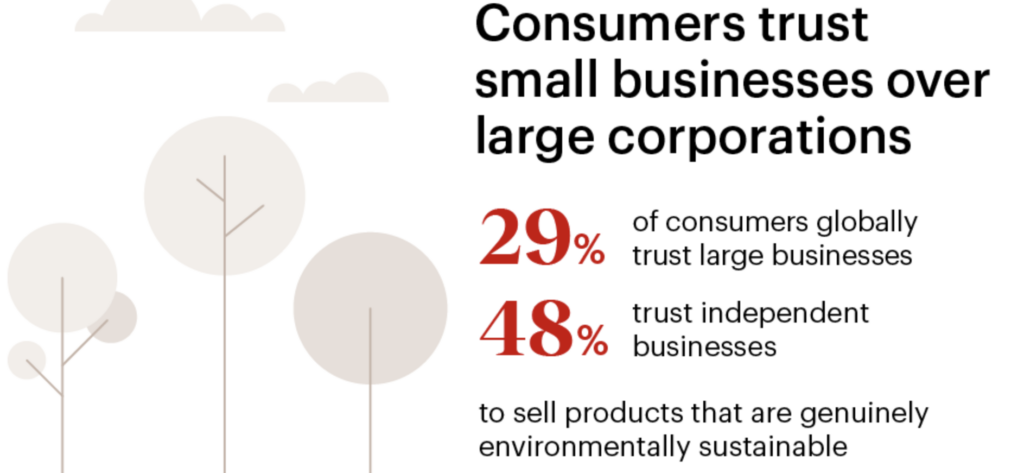
Brands should be ready to acknowledge the fragmented market and build a more agile supply chain. Marketing becomes more complex as different consumer segments require different messaging now. “For example, a plant-based spread could be promoted with one set of messages to a consumer group whose primary concern is animal welfare and with completely different messages to those who are focused on healthy food,” the report said.
Fixing the packaging is critical as well, both in terms of sustainability and communicating its value. “The best companies will avoid making packaging out of multiple different materials so that it needs to be disassembled to recycle,” Bain stated. Working with retailers, brands can help clear consumer confusion about packaging sustainability and recyclability.
And finally, fostering the right partnerships can help companies accelerate the sustainability transition.
“With so many consumers telling us that accessibility is one of the key barriers preventing them from purchasing sustainable products, companies can collaborate to ensure prominent product placement and encourage new behaviour in areas like refills or packaging returns,” the report read.



